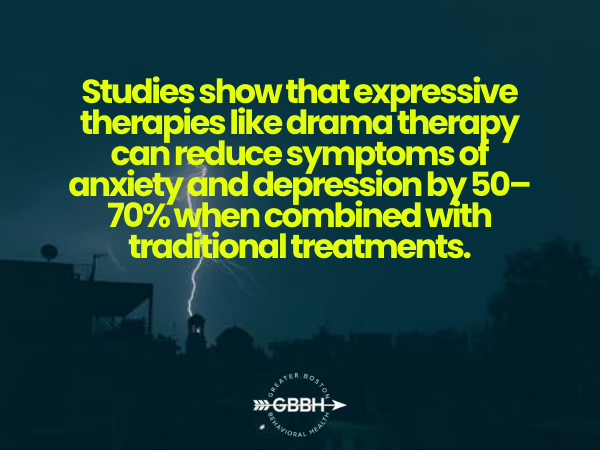Mental health therapy often conjures images of one-on-one sessions in a quiet office, but there are many innovative and dynamic approaches to healing. One such method is drama therapy, a creative and expressive form of psychotherapy that uses theatrical techniques to help individuals explore emotions, improve self-awareness, and process trauma. For those in recovery, especially in structured settings like a Residential Treatment Program, drama therapy can be an invaluable tool for growth and healing.
At Greater Boston Behavioral Health, we believe in integrating diverse therapeutic methods to address the unique needs of our clients. As a leader in Boston behavioral health, we incorporate drama therapy into our comprehensive Mental Health Treatment Programs, offering a pathway to healing that is both creative and transformative. In this blog, we’ll explore what drama therapy is, how it works, and why it’s effective for individuals struggling with anxiety, depression, trauma, and more.
What Is Drama Therapy?
Drama therapy is an evidence-based therapeutic approach that uses drama and theater techniques to facilitate emotional and psychological healing. It combines elements of psychology, acting, and play to create a safe space where individuals can express themselves, explore their emotions, and gain new perspectives on their challenges.
Core Techniques in Drama Therapy:
- Role-Playing: Acting out scenarios to explore relationships, emotions, or past events.
- Storytelling: Sharing personal narratives or creating fictional stories to process experiences.
- Improvisation: Spontaneous acting that encourages creativity and emotional release.
- Scripted Performances: Using pre-written scripts to explore themes like loss, resilience, or hope.
- Movement and Body Work: Incorporating physical expression to release tension and process emotions.
Drama therapy is particularly beneficial in group settings, such as Residential Treatment Programs, where participants can collaborate, build trust, and support one another through shared experiences.
The Benefits of Drama Therapy
Drama therapy offers a unique set of benefits that complement traditional therapeutic approaches like CBT Therapy and DBT Therapy. By engaging the mind, body, and emotions simultaneously, it fosters holistic healing and personal growth.
1. Enhanced Emotional Expression
For individuals who struggle to articulate their emotions verbally, drama therapy provides alternative ways to express themselves. Role-playing or storytelling can make it easier to explore difficult feelings like anger, sadness, or fear.
Example:
A client in an Anxiety Treatment Program might use improvisation to act out a stressful situation, allowing them to process their feelings in a controlled and supportive environment.
2. Increased Self-Awareness
Through drama therapy, individuals gain insights into their behaviors, thought patterns, and emotional responses. This self-awareness is essential for developing healthier coping mechanisms.
Example:
In a Depression Treatment Program, a participant might reenact a situation where they felt overwhelmed, helping them identify triggers and explore alternative ways to respond.
3. Processing Trauma
Drama therapy is particularly effective for individuals dealing with trauma. By creating a safe space to revisit and reinterpret traumatic events, participants can begin to process and release unresolved emotions.
How It Works:
- Participants may act out a past event from a third-person perspective, gaining distance and clarity.
- Through storytelling, they can reframe their narrative, shifting from a place of pain to one of empowerment.
4. Building Social and Interpersonal Skills
Drama therapy often involves group work, which encourages collaboration, empathy, and active listening. This is particularly beneficial for individuals in Mental Health Therapy Programs who struggle with social anxiety or relationship challenges.
Example:
A group therapy session might involve acting out a scenario that requires conflict resolution, helping participants practice effective communication skills.
5. Reducing Stress and Anxiety
Engaging in creative activities like drama therapy can lower stress levels and promote relaxation. Techniques like role-playing or movement-based exercises help release pent-up tension and foster a sense of calm.
Example:
In a Residential Treatment Program, participants might use drama therapy to explore grounding techniques, such as focusing on their body’s movements during a performance.
How Drama Therapy Fits into Behavioral Health in Boston
In the fast-paced environment of Boston behavioral health, individuals face unique challenges related to stress, trauma, and mental health conditions. Drama therapy provides an engaging and effective approach to address these issues, offering a break from traditional therapy formats.
Why It Works for Boston Residents:
- Cultural Diversity: Boston’s rich cultural landscape aligns well with the creative and inclusive nature of drama therapy.
- Busy Lifestyles: Drama therapy offers a dynamic way to process emotions, which can appeal to those who struggle with more passive forms of therapy.
- Collaborative Communities: Group-based drama therapy fosters connection and support, which are vital for urban environments.
At Greater Boston Behavioral Health, we integrate drama therapy into our broader Mental Health Treatment Programs, ensuring that every client receives personalized care tailored to their unique needs.
Drama Therapy in Residential Treatment Programs
For individuals in a Residential Treatment Program, drama therapy provides a structured yet flexible way to address complex emotional challenges. The immersive environment of residential care allows participants to fully engage with the therapeutic process, maximizing the benefits of drama therapy.
What to Expect in a Drama Therapy Session:
- Warm-Up Activities: Exercises to build trust and create a safe, supportive atmosphere.
- Exploration: Role-playing, storytelling, or improvisation focused on specific therapeutic goals.
- Reflection: Group discussions to process emotions and insights gained during the session.
- Application: Identifying ways to integrate lessons learned into daily life and recovery.
Drama therapy is often combined with other evidence-based approaches, such as DBT Therapy or CBT Therapy, to create a well-rounded treatment plan.
Who Can Benefit from Drama Therapy?
Drama therapy is versatile and can benefit individuals with a wide range of mental health challenges, including:
- Anxiety Disorders: Helps reduce stress and build confidence in social interactions.
- Depression: Provides a creative outlet for exploring emotions and finding hope.
- Trauma and PTSD: Offers a safe space to process and reframe traumatic experiences.
- Addiction Recovery: Encourages self-expression and emotional healing during recovery.
Whether you’re participating in an Anxiety Treatment Program, a Depression Treatment Program, or a comprehensive Mental Health Therapy Program, drama therapy can play a vital role in your recovery journey.
Why Choose Greater Boston Behavioral Health?
As a leading Mental Health Treatment Center in Boston, we are dedicated to providing innovative and evidence-based care. Drama therapy is just one of the many tools we use to help our clients achieve emotional well-being and long-term recovery.
What Sets Us Apart:
- Experienced Clinicians: Our team includes certified drama therapists and experts in traditional therapeutic modalities.
- Comprehensive Care: We combine drama therapy with DBT Therapy, CBT Therapy, and holistic wellness practices for a well-rounded approach.
- Supportive Environment: Our treatment center offers a safe, nurturing space for creative exploration and healing.
Conclusion
Drama therapy is more than just a creative outlet—it’s a powerful tool for self-discovery, emotional healing, and personal growth. At Greater Boston Behavioral Health, we are here to guide you every step of the way.
Contact us today at (888)278-0716 to learn more about our Residential Treatment Programs, Mental Health Therapy Programs, and how drama therapy can support your journey to recovery.
FAQ on Drama Therapy and Its Role in Mental Health
What is drama therapy?
Drama therapy is an evidence-based therapeutic approach that uses theatrical techniques like role-playing, storytelling, and improvisation to help individuals process emotions, improve self-awareness, and foster healing.
How does drama therapy help with mental health?
Drama therapy provides a creative outlet for exploring emotions, managing stress, processing trauma, and improving social and communication skills, making it especially effective for individuals with anxiety, depression, or PTSD.
Can drama therapy be part of a Residential Treatment Program?
Yes, drama therapy is often integrated into Residential Treatment Programs to provide immersive and holistic care for individuals recovering from severe mental health challenges.
Who can benefit from drama therapy?
Drama therapy is beneficial for individuals struggling with anxiety, depression, trauma, PTSD, or those looking for creative ways to enhance emotional expression and self-awareness.
Does Greater Boston Behavioral Health offer drama therapy?
Yes, we include drama therapy as part of our Mental Health Treatment Programs, combining it with evidence-based therapies like DBT Therapy and CBT Therapy.


